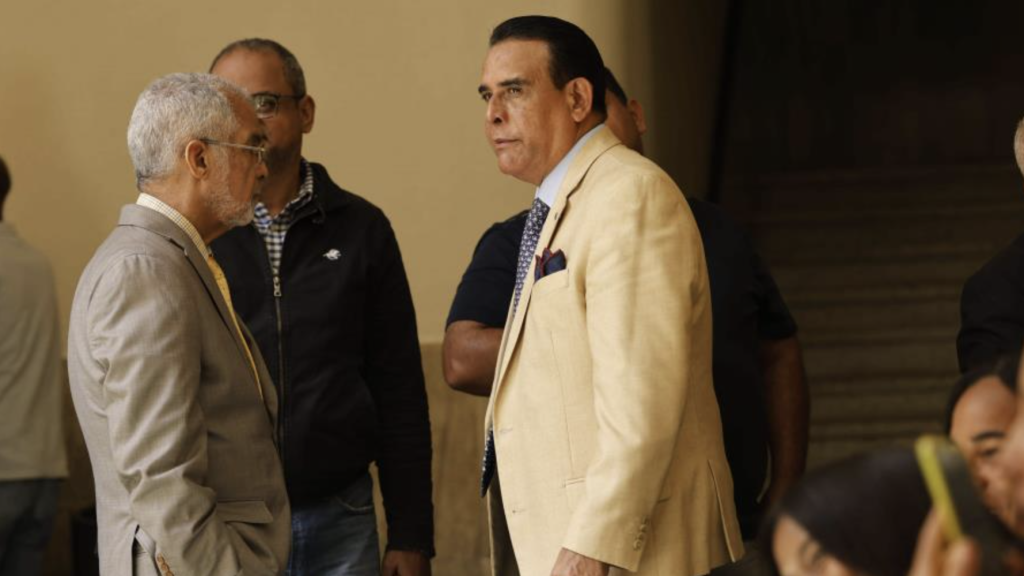
On 17 March 2025, the Second Collegiate Court of the National District rejected a request by Alexis Medina Sánchez, Magaly Medina Sánchez, and 11 other defendants in the Anti-Pulpo case, seeking to dismiss criminal charges against them. The Anti-Pulpo case looks into corruption charges for the brother and sister of former President Danilo Medina taking advantage of their relation with the President to secure multiple government contracts and carry out activities in violation with the law.
Francisco Álvarez Valdez (Pancho) of the civic movement, Participacion Ciudadana commented on the positivity of the decision by the court, saying it is fully justified, especially when considering the procedural conduct of the accused.
Álvarez Valdez presented the fourth report of the Observatorio de Casos de Corrupción Administrativa by Participación Ciudadana.
The civic movement Participación Ciudadana (PC) praised the recent trend in the Dominican Republic’s judicial system, where judges have rejected requests from individuals accused of corruption to dismiss criminal charges due to the expiration of the four-year statute of limitations prescribed by law.
Francisco Álvarez Valdez’s (Pancho) remarks came alongside the presenting of a PC report that highlights that, during the observation period (January-March 2025), delays were primarily due to medical leave requests from the accused. These included the 27 January and 28 February hearings, which were postponed due to medical certificates from defendant Víctor Matías Encarnación, and the 29 January, which was delayed due to the medical issues of defendant Aquiles Christofer Sánchez. Additionally, the 10 March hearing was postponed until 17 March following the request for the dismissal of charges.
Alvarez said that the 17 March hearing ruling aligns with the judicial trends of the Dominican Republic’s courts and the Constitutional Court. He noted that the maximum duration of a trial should be linked to the “reasonable” time stipulated in the Constitution, and it is not possible to calculate this duration mathematically.
“It is also unreasonable to impose a page limit on the Public Prosecutor’s Office when presenting their charges or restrict the number of people they can indict in a single case. Similarly, defense attorneys should not be limited in the evidence they can present or in the time they dedicate to defending their client,” he argued.
The 17 March ruling sets a precedent that could also be applied to other cases of corruption against former officials in the Medina administration. This includes the Coral and Coral 5G cases involving the former presidential security chief and director of the tourism police, where there were eight delays due to late hours and five delays for medical leave presented by the accused. The Medusa case, involving the former attorney general, experienced six delays, while the Calamar case, involving the former minister of Hacienda, had a single postponed hearing.
The civil group warned that cases involving public resources amounting to billions of pesos should not be allowed to end without substantive rulings due to inefficiencies in the system or strategies aimed at delaying or ending the cases prematurely.
PC held a panel titled “High-Level Corruption Cases: Justice and Media Coverage” and presented its latest report on the high-profile corruption cases currently in court and their media treatment.
The organization welcomed the panel discussion, emphasizing its importance in understanding both the judicial process and public perception of corruption cases. In the report, PC documented every delay in hearings, noting that most were caused by the accused.
On the topic, Listin Diario interviewed Rudolfo Valentín, director general de la Oficina Nacional de la Defensa Pública who looked into several reasons for delays in justice, including the presenting of extensive cases by the prosecutors, the deficiencies in quality of work of the judiciary, and numerous delays caused by the defense that seeks to reach the four-year term and then seek a filing of the case.
The Anti-Pulpo case has advanced to the stage when the prosecutors have presented their concluding statements. Diario Libre reports in their closing arguments on Wednesday, 26 March 2025, the Public Prosecutor’s Office reaffirmed that it has irrefutably proven how Juan Alexis Medina Sánchez led an alleged corruption network through which he defrauded the Dominican state via the Office of Engineers Supervising State Works (Oisoe) and the Ministry of Public Works and Communications (MOPC). Oisoe was eventually closed after years of corruption claims.
Prosecutor Elizabeth Paredes emphasized that Oisoe was at the heart of the corruption scheme, where Medina Sánchez, with the complicity of high-ranking officials, orchestrated a fraudulent operation involving the purchase of contracts, the submission of fictitious credit assignments, and the improper awarding of public works projects.
The Public Prosecutor’s Office detailed that, to carry out this fraud, Medina Sánchez relied on the involvement of legal consultant Lina de la Cruz Vargas, Pachrysty Ramírez, Víctor Encarnación, and Aquiles Christopher, as well as the already convicted Francisco Pagán, former director of Oisoe. These key players helped facilitate the structure that allowed Medina Sánchez to secure contracts illegally and embezzle state funds, the office added.
Read more in Spanish:
Presidency
Diario Libre
Diario Libre
Diario Libre
Participacion Ciudanana
Listin Diario
Diario Libre
27 March 2025

